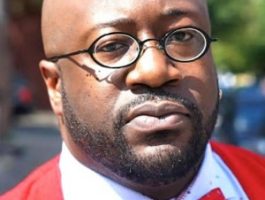
Characteristics of a Repentant Spouse
Are you looking for something that can revolutionize your marriage? Eric Mason says you might want to start with a little repentance. He shares characteristics of a genuinely broken, truly repentant spouse, based on Psalm 51.
Show Notes
About the Host
About the Guest
-
Are you looking for something that can revolutionize your marriage? Eric Mason says you might want to start with a little repentance. He shares characteristics of a genuinely broken, truly repentant spouse, based on Psalm 51.
-
Dave and Ann Wilson
Dave and Ann Wilson are hosts of FamilyLife Today®, FamilyLife’s nationally-syndicated radio program. Dave and Ann have been married for more than 38 years and have spent the last 33 teaching and mentoring couples and parents across the country. They have been featured speakers at FamilyLife’s Weekend to Remember® marriage getaway since 1993 and have also hosted their own marriage conferences across the country. Cofounders of Kensington Church—a national, multicampus church that hosts more than 14,000 visitors every weekend—the Wilsons are the creative force behind DVD teaching series Rock Your Marriage and The Survival Guide To Parenting, as well as authors of the recently released book Vertical Marriage (Zondervan, 2019). Dave is a graduate of the International School of Theology, where he received a Master of Divinity degree. A Ball State University Hall of Fame quarterback, Dave served the Detroit Lions as chaplain for 33 years. Ann attended the University of Kentucky. She has been active alongside Dave in ministry as a speaker, writer, small-group leader, and mentor to countless wives of professional athletes. The Wilsons live in the Detroit area. They have three grown sons, CJ, Austin, and Cody, three daughters-in-law, and a growing number of grandchildren.
-

Eric Mason
Eric Mason is the founder and lead pastor of Epiphany Fellowship in Philadelphia, PA. In addition, to his role at Epiphany Fellowship he serves as President of Thriving. A ministry dedicated to aiding ethnic minorities to be resourced and trained for ministry to the urban context. He has also contributed to multiple publications to service the body of Christ. Dr. Mason is known for articulating and proclaiming the gospel with clarity, passion, and authority at churches and conferences nationa...more
Are you looking for something that can revolutionize your marriage?
Bob: Are you looking for something that can revolutionize your marriage? Dr. Eric Mason says, “You might want to start with a little repentance.”
Eric: Do you know how much relief can happen and healing can happen in people’s lives if you would just say, “I am so sorry for what I did, and I repent!”
Bob: This is FamilyLife Today for Tuesday, March 5th. Our host is the President of FamilyLife®, Dennis Rainey, and I’m Bob Lepine. We’re going to hear, today, the characteristics of a genuinely broken, truly repentant spouse. Stay with us.
And welcome to FamilyLife Today. Thanks for joining us on the Tuesday edition. You know, I was just sitting here thinking about the fact that a couple of weeks ago we were on the Love Like You Mean It™ marriage cruise. Going on a cruise is, for a lot of us, it’s kind of one of those once-in-a-lifetime—you don’t get to do it very often.
Dennis: We’ve hosted, now, three of these Love Like You Mean It cruises. It is a lot of fun, but it is—in our case, I think it is one of the most informative, life-changing opportunities to spend some really fun days and evenings with the love of your life— walking around on deck, having conversations, not being interrupted by this shiny thing I’ve got in my pocket—
Bob: My cellphone—
Dennis: —this screen—this screen—
Bob: —it was off for three days.
Dennis: Three days. Did you go through withdrawal?
Bob: I didn’t! I didn’t miss not looking at the email. I didn’t go down and log-on for anything.
Dennis: Yes.
Bob: I just kept having fun with Mary Ann.
Dennis: I want to read you a quote. This is from someone who just came. They’ve been married for 29 years. They said, “The first day was somewhat awkward since we hadn’t spent dedicated time with each other and without distractions.” Then, they said the couple’s “onion was slowly peeled off, one layer at a time. And by the end of the week, the onion had disappeared. [Laughter] Amen to this wonderful and eternal experience!”
I don’t think people can begin to realize this can be a transformational experience for an individual,—
Bob: Yes.
Dennis: —for a couple, for, really, a family—because you are going to gain things, on the cruise, that are going recalibrate you as you go back to experience life.
Bob: And there are times in your marriage where you intentionally want to make some memories—where you want to do some special things. So, whether it’s a special anniversary coming up or some celebration—something you are trying to acknowledge—to join us and be part of the Love Like You Mean It marriage cruise. Well, we just think it’s a good opportunity for you to invest in your marriage, to have some fun together, and to make a memory.
I mention that because the 2014 cruise is about half sold out right now. On March 15th, the prices go up for the cruise. So, we thought, “Let’s give our FamilyLife Today listeners two things. Let’s give them an opportunity to hear some of the messages from this year’s cruise”—because there were some great messages—
Dennis: Right.
Bob: —“and also, to give you an opportunity to register to be with us next year and to save some money.” So, if you want to go to FamilyLifeToday.com and click on the link there for the Love Like You Mean It marriage cruise, you can get all the details. We sail Valentine’s week next year, February 10th through the 14th. Again, go to FamilyLifeToday.com and click the link for the Love Like You Mean It marriage cruise; or call 1-800-FL-TODAY for more information.
Dennis: And I have to tell you, Bob, the last night of the cruise, we end the evening on top of the pool deck with couples. This year, they were around a sculpted ice heart that was melting, there in the breeze, and wedding cake. We lead couples through their vows. And it really is a great ceremony and just a tremendous way to put an exclamation point on a great week.
Bob: Yes, the ice heart wasn’t the only heart melting up onboard the pool deck—
Dennis: Yes.
Bob: —that last night.
Dennis: Well-said, Bob, well-said.
Bob: [Laughter] Now, we’re going to—we want you to hear a portion of a message from Dr. Eric Mason. Eric is the pastor of Epiphany Fellowship in Philadelphia. He and his wife joined us, onboard the cruise; and he spoke on Tuesday night. He spoke about what seeking forgiveness really needs to look like and what are the characteristics of genuine repentance in a marriage. And here, with his message from Psalm 51, is Dr. Eric Mason.
[Recorded message]
Eric: Let’s get it. Verse 1 [and following] says:
Have mercy on me, O God, according to Your steadfast love, according to Your abundant mercy. Blot out my transgressions. Wash me thoroughly from my iniquities and cleanse me from my sin; for I know my transgressions, and my sin is ever before me. Against You, and You only, have I sinned and have done what is evil in Your sight, so that You may be justified in Your words and blameless in Your judgment.
Behold, I was brought forth in iniquity and in sin did my mother conceive me. Behold, You delight in truth in the inward being, and You teach me wisdom in the secret heart. Purge me with hyssop, and I shall be clean. Wash me, and I shall be whiter than snow. Let me hear joy and gladness. Let the bones that You have broken rejoice.
I want to talk about, tonight, of course, as you see, the characteristics of a repentant spouse. As I grow as a believer, and as I get to connect with Christians and Christians who grow and mature in different ways, we can become a big facade in our lives, where we’re not willing to admit where we are because we’ve become skilled at hiding where we actually are.
So, there comes a time and there comes a need in our lives when we have to get to the point, as believers: “Will we live our lives open and bare before the Lord?” Are we going to be honest and open up ourselves before Him and the people around you? If you want to grow, if you want to develop, if you want to be better for His glory—not a self-help message—but a Gospel message—where we begin to say, “Hey, God, I am sick and tired of being sick and tired; and I want to be open before You.”
So, we come to this passage, which, I believe, is sort of the sine qua non of repentance in the Bible. It’s one of those passages that play a phenomenal roll in us recognizing what repentance is and what repentance looks like. The word in the Old Testament usually for repentance that points out its principle here is the word nicham which points to the idea of turning the other direction. In the New Testament, the word is metanoia. The word metanoia doesn’t just mean change the direction. It means to change your way of thinking about whatever you’re thinking about that’s opposite of what God already knows and embrace His mindset.
That points to the reality—listen—that without repentance, we are walking in a stronghold. How do I know that? Because Second Corinthians, Chapter 10, says that we must take every thought captive, in obedience to Christ, that which exalts itself against Him. So, the stronghold isn’t the actual sin that we commit, but it’s the mindset that shapes the execution of the sin that we commit. That stronghold barricades us in from turning from our sin and turning from the living God.
So, David sins by committing adultery and murder. He comes to a point later, which we will get to, where he gets confronted with his sin by a friend that came and got in his grill—in his face. He said, “David, I want to tell you a story.” He said, “Come on, man, tell me a story. I love your stories, Nate.” Nathan starts telling the story. He said, “Man, there is this man. He had a whole bunch of sheep.” He said, “Okay. Okay.” He said, “And there was one who had one little sheep that he took care of—beautiful, beautiful sheep.” He said, “Okay.” “This dude that had a whole bunch of sheep came over, got with him, took his sheep, got rid of him, and put him with the other sheep—even though, he had a whole bunch of sheep.” David said, “Bring him here right now!” He said, “You’re the man.”
See, it’s interesting that David had a lot of self-righteousness when it came to somebody else’s sin; but when it came to him dealing with his sin, he’s going to say, what we hear in the first part of this chapter—which I think we all should call upon and work through, as people who are to be repentant spouses—which brings me to my first point of—if you’re going to walk out the characteristics of a deeply-repentant spouse.
Number one: You must throw yourself on the character of God. Right here, David says, “Have mercy on me, O God.” I like the fact that he calls for God’s mercy because he called on God’s character before he dealt with his sin. This is very, very important because if you focus in on your sin first—then, you’ll get depressed. You’ll get frustrated, and you’ll feel locked in—but if you put your mind on the character of God, then, you’ll have encouragement to deal with your sin. But if you try to deal with your sin, without the character of God, you will get in deeper bondage. That’s why you need the Gospel, not self-righteousness, because the Gospel is the willingness to submit ourselves to the beauty of the character of God so that Christ’s righteousness can cover our sin and deal with it.
So, we call on God’s character, not our sin. You’ve got to make sure God’s—you’ve got to make sure—in your life, no matter where you are—and in your marriage, that the character of God and the perfections and attributes of God are driving your marriage, not just your sin, because if you just mention your sin to each other all the time, then, all you’re going to do is argue about your sin: “Well, you sinned against me.” “No, you sinned against me.” “Well, the other day it was you.” “Now, today it was you.” “No, you remember when you did...”—and you’re just going—back, and back, and back, and back. But if you focus on God’s mercy and you look at the little bit that your spouse did to you, in light of the holiness of God and on your life, you say: “God, I deserve this. So, how am I going to add on and push on to them what You didn’t give to me?”
So, my man David, he begins to throw himself and calls on the attributes that he needs. Then, after that, he says something beautiful. He says, “According to Your steadfast love...” I like that. That’s the Hebrew word, hesedh. And that word means loyal love. Somebody say, “Loyal love.”
Audience: Loyal love.
Eric: Loyal love points to this—God’s unconditional covenant with His people. That means He’s faithful, even though we’re not faithful. David isn’t calling on family. He’s not calling on—like, “God, I’ve been killing it for Your glory. I’ve been spending time in the Word. I just think I just deserve some love right now.” No, that’s not what he does. What he does is he says: “I know I’ve messed up beyond the worst level of messing up. What I need is—I need the God, right now, who will deal with me based on His commitment to covenant, not my failure of the covenant.” See, that’s what’s so good about the new covenant through Christ, though—is the new covenant, through Christ, is an unconditional covenant, where God does all the work of the covenant. We work because of His love, not working to get His love. He lays out, for us, this covenant love in this steadfast love.
Then, he says, again, “According to your abundant mercy...” Then, he begins to deal with his sin. Then, he begins to say, “Lord,”—he says: “Blot out my transgressions. Wash me thoroughly”—he says, “I want it all gone, God.” He says, “I don’t want any trace of my mess”—just let me build a foundation. He said he doesn’t want any of his mess to get in the way of his relationship with the living God. He says, “Cleanse me from my sins.” So, he asked for full cleansing from his sin.
First thing, we see—if you are going to be a deeply-repentant spouse—is the attributes of God: God’s mercy, God’s love, God’s grace, God’s longsuffering, God’s spirituality, God’s omniscience, God’s omnipresence—His attributes must pervade a marriage because the more your mind is on the Lord and your marriage—and not just the faults of your spouse—then, you can deal with sin.
But then, next, number two: If you are going to succeed, the characteristics—and this can apply to anyone, even though we are applying it specifically to a spouse—but next point—if you’re going to walk in the characteristics of a deeply-repentant spouse—number two: You must fully own the extent of your sin.
David says, “I know my transgressions.” Now, the word here for “know” means to know something intimately. When he says, “I know my sin,” that means he is able to absolutely, unadulteratedly acknowledge what he did. That means he knows the sinfulness of his sin. He didn’t try to say: “Well, it wasn’t like So-and-so over there. You know how he did or how she did....” No, no, no. That’s not what he’s saying. He’s saying: “I’m talking about I know my own transgressions. I know the sinfulness of my sin.” See, you can’t repent until you know how sinful your sin is. See, a part of the most authentic and powerful thing a Christian can do is own their sin. You can’t even get saved until you own your sin!
That’s what the Bible says—that you have to confess with your mouth that Jesus is Lord. You have to acknowledge that there is a sin issue for the cross to pay for sins—but, as a believer, once you start walking with Him, you’re provisionally certified and Kingdom-bound—but you are still, practically, a mess. So, you better get used to learning how to repent. Some of us, in this house—and I fight with it every day, myself. That’s why I’m yelling right now because I’m preaching to myself [Laughter]—that I have to fight self-righteousness! I have to fight not wanting to acknowledge stuff. I have to fight unforgiveness and anger—when the Bible says, “Reject the root of bitterness, sprouting up, that it may devour many.”
Where does bitterness come from? It’s fermented unforgiveness and anger. And guess what it leads to? Bitterness leads to unrepentance and soul-corrosion. And that’s why David says, “I know the extent of my sin.” Proverbs talks about the fact: “He who confesses a matter”—28:13—“and forsakes it, finds favor.” So, that means, in our marriages, we have to begin to talk honestly about stuff that happened in our past.
David talked about knowing his sin. He talks about the fact that God is justified in saying to him whatever He wants to say to him—look at it. It says, “Against You, and You only, have I sinned and have done what is evil in Your sight, so that You may be justified in Your words.” I like David’s words when Nathan came to him, and he says, “You’re the man.” He says, “I’ve sinned against the Lord.” He didn’t have a paragraph of information to give out to give an atmosphere for the reasoning behind why he sinned. No, he owned his sin. He said, “I have sinned against the Lord!” You don’t make any concession. No, you say, “I have sinned!”
Audience: Amen.
Eric: Do you know how much relief can happen and healing can happen in people’s lives if you would just say, “I am so sorry for what I did, and I repent!”? That’s why God told the leaders in Job—He said, “Rip your heart, not your garments,” because they got used to—you know, when something bad happened—you know, they were so religious. They knew the religious thing to do was to rip their garments—to look like they were devastated—but in their heart, they were hard, and caked over, and no transformation.
But Jesus Christ did not come for us to have the same old, nasty, funky, trifling, hard heart. He came—based on Ezekiel 36, verses 25-27—He said: “I will sprinkle you clean with water. I will remove the heart of stone and put a heart of flesh in you. I will take the old spirit out of you, put a new spirit in you, put My Spirit on you, put My Word in you, and cause you to walk in My statutes.”
When He gives you a new heart, He gives you receptivity—that means a new value system, new affections, and your will being taken out of bondage to be able to serve Him—so that, now, you can repent of your sin and you can own up to stuff. He did not come so that you could cake the new heart over with the old mess. [Clapping] That’s why you got to own your stuff, instead of not admitting it—then, it cakes over, cakes over, cakes over—bondage gets deeper.
So, he goes down, and he says—he says, “Against You, and You alone, have I sinned.” He is saying that to say, “God, ultimately, my sin is against You.” That’s great! You can’t deal with your sin with man until you deal with your sin before God—
Audience: Amen.
Eric: —because, ultimately, it is His holiness that has been infringed upon. So, in dealing with God, it makes it real, in dealing with others, because if you deal with man, first and only, you’re only concerned about the consequences and situation that got messed up by your sin. So, you’re trying to clean up on your own. But when you go to God first, “Against Thee, and Thee only, have I sinned,” then, you trust Him, without your help, to work out, good or bad, what He’s going to work out with your help. That means you don’t try to fix stuff on your own.
See, a repentant person submits to discipline. He submits to it. That’s why he says, right here—he’s submitting to the discipline of the Lord, which brings us to our last point. The repentant person longs for long-term transformation. Look at what he says—he says, “Behold, You delight in truth in the inward being…and teach me wisdom in the secret heart.” This is crazy, right here, in a good way, because check it. When he says, “Delight,” he is talking about what God likes, inside of His people. He’s not just talking about like on the outer crevices of His people. He says, “...in the inward part”—he uses two terms. He says, “inward part”, and then, he said, “secret places”.
So, what he is saying here is, “You like it and You delight”—the word here means to emotionally take joy in someone, something, or some place. Now, he says, “You delight in truth.” Now, truth, here in the Hebrew, doesn’t just mean information, even though it involves information. The word, here for truth, means to have certainty. It means firmness, stability, faithfulness, fidelity—which means commitment—uprightness, integrity, faithfulness, and authenticity.
I love this because this is some real-deal Christianity here. Why is it? Because he says, “You desire the places that I’ve closed off from You to be reopened in my life for You to deal with.” See, David is even getting beyond the sin of adultery in the passage. He’s going to the deeper root of the things that led up to the adultery—the type of heart that led up to the adultery, the type of mindset, and the other litany of things in his life.
See, you’re looking at me funny. Let me see if I can make it plain. At the church, we had an exterminator. We bought the building. We didn’t—you know it’s a 130-year-old building. It was all types of things—factory—all kinds of things. And we got some work done on it, and we got the first exterminator visit. Exterminator comes in; and he says, “Pastor, tell your team I need everything opened up—every single thing that has a knob on it.” I said, “Why?”
He says: “Pastor,” —he says, “...because if I clean in these spots, but there is still mess in these closed spots—when you open these spots, it will befoul the spots up here that I’ve cleaned out. So, what I need you to do is I need you to open every single door in this building—everything that has a knob on it—because I’m going to go on the inside of all of those places, and I’m going to deal with every infestation—but the only way I can get to them is if you open them all up.”
That’s what Jesus is saying to you today, “Why don’t you open your life?” See, some of you all need to open up—you say: “Now, see, Jesus, I haven’t opened this door in 20 years; but—I don’t even know what’s in there anymore. I’ve put some stuff just away.” That’s what Jesus Christ came to do. No matter where you are in life, and no matter how pristine you think you are, you are in desperate need of the cross of Christ. And that’s what David says next, “Purge me with hyssop, and I shall be clean.” He said, “Wash me, and I shall be whiter than snow.” He’s like, “God, I want You to absolutely, unadulteratedly, fully cleanse me.”
And I’m glad, in the new covenant, we have the blood. Listen to this—he says in verse 8—I’m closing—he says: “Let me hear joy and gladness. Let the bones that You have broken rejoice.” He’s been so deep in his sin—he says, “I can’t believe how much I’ve missed out on life.” Let me tell you something—when you don’t repent of sin, you miss out on so many good things. And God is saying to you: “I want you—open up every area of your life. Come to Me, all you who are heavy laden, and I will give you rest. Take my yoke upon you and learn of Me, for I am meek and lowly of heart; and you will find rest for your soul.” Come to Him, and let it go!
Guess what the Gospel frees you to do—to not worry about your sin anymore. That’s what gives you the ability to repent—is that Jesus already paid for it. Since He already paid for it, you might as well admit it. [Clapping]
[Studio]
Bob: Tell you what—we were having church, onboard the cruise, with Eric Mason.
Dennis: We were. I’ll just read you some of the quotes of the folks who have been on the cruise. I’ve got a quote here from a couple, where the wife has been asking God for her husband to lead, spiritually, in their relationship. She said, “We started praying, together, for the first time in our marriage, after more than a decade.”
That can happen in a week-long experience, where you’re kind of sitting and soaking in—not just the sun—but in the Scriptures—
Bob: Yes.
Dennis: —and you’re hearing the Scriptures applied to the everyday issues you face in your marriage and family and, really, helped in applying them.
Bob: You and I are going to be speaking on next year’s cruise, along with Dr. Gary Chapman, the author of the book, The Five Love Languages. Crawford and Karen Loritts are going to join us. Ron Deal’s going to be onboard, with help for blended couples—couples in a blended marriage.
So, if listeners would like to join us, they need to get in touch with us soon. Go to FamilyLifeToday.com. Click on the icon for the Love Like You Mean It marriage cruise. Click that link, and all the information is available there. Or call 1-800-FL-TODAY with any questions you might have. We’ll see if we can answer those for you. The price for the cruise increases on March 15th. So, if you are interested in attending, now is the time to get in touch with us. Again, go to FamilyLifeToday.com for more information; or call 1-800-“F” as in family, “L” as in life, then, the word, “TODAY”. We’ll see if we can answer any questions you might have about the cruise.
Now, tomorrow, we want to encourage you to be back with us because we’re going to get the big picture of marriage—I mean—the big picture of marriage.
Dennis: I don’t know that I’ve heard a message out of Revelation—
Bob: About marriage?
Dennis: —about marriage until Voddie Baucham gave one. Really, it was a big-picture message, calling people to realize that there’s a lot more at stake in your marriage than just your happiness.
Bob: Well, and you’ll hear a portion of that message tomorrow as you tune in. I hope you can join us.
I want to thank our engineer today, Keith Lynch, and our entire broadcast production team. On behalf of our host, Dennis Rainey, I'm Bob Lepine. We will see you back next time for another edition of FamilyLife Today.
FamilyLife Today is a production of FamilyLife of Little Rock, Arkansas. Help for today. Hope for tomorrow.
We are so happy to provide these transcripts to you. However, there is a cost to produce them for our website. If you’ve benefited from the broadcast transcripts, would you consider donating today to help defray the costs?
Copyright © 2013 FamilyLife. All rights reserved.
1





